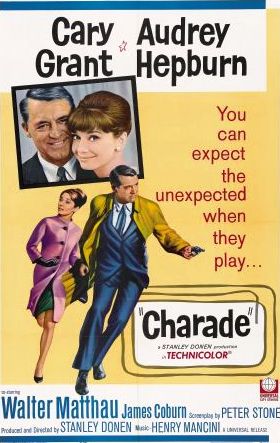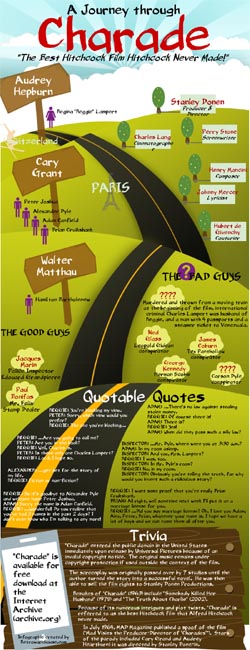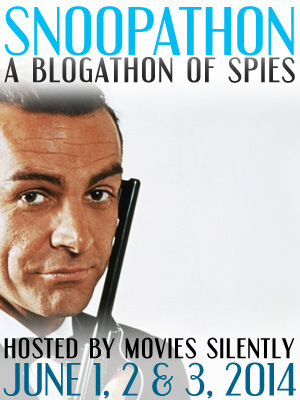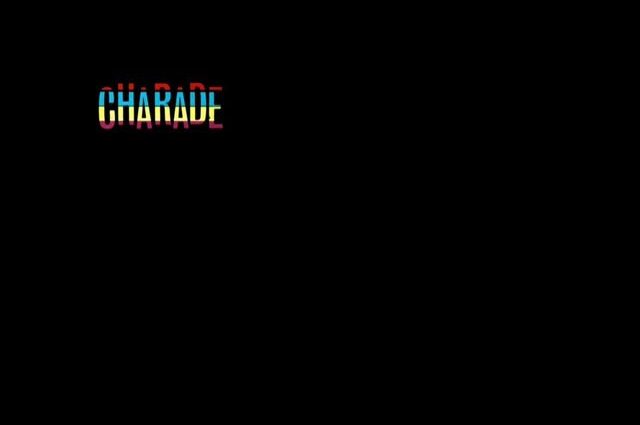Every classic film buff — especially if they are a fan of Cary Grant or Audrey Hepburn — is familiar with Charade, which surely they’ve seen several times over. They already know the plot about the recently widowed woman who finds herself being pursued by a grim group from the CIA, OSS, and who knows from where else. They all want the gold her murdered husband stole from them and the French Resistance during World War II.
Does she have the fortune he left behind? If not, who has it, where is it, and how can they get their hands on it?
 Charade is one of those films that defies categorization, so it appropriately befits its own title. Pick a source and you’re likely to get a different label: romance, comedy, romantic comedy, thriller, mystery, romantic mystery, romantic thriller, comic thriller, suspense thriller, mystery farce, whodunit, spellbinder, spy thriller.
Charade is one of those films that defies categorization, so it appropriately befits its own title. Pick a source and you’re likely to get a different label: romance, comedy, romantic comedy, thriller, mystery, romantic mystery, romantic thriller, comic thriller, suspense thriller, mystery farce, whodunit, spellbinder, spy thriller.
You can bet that “Charade” comfortably fits in any of those genres, and it offers a top-notch script noted for its repartee between the leading characters, features experienced actors who give strong performances, and provides a refreshingly light cadence during a time when the country needed an uplifting experience.
I won’t retell the story here, because you probably already know it. Instead, I’ve compiled a few behind-the-scene items related to the film and making of the film since I’m a lover of “The Backstory.” I’ve included also a few side notes about some of the personalities involved with the film. I don’t ignore the story line altogether, however, and have created an infographic about “Charade” — you can take that journey here!
Meanwhile, The Backstory…
The early minutes of “Charade” were taped in Megève, Switzerland and the French Alps, but most of the film’s 113 minutes were recorded on sets and on location in Paris, in a ramshackle Latin Quarter hotel and in areas of the Tuileries district, in October 1962.
Charade was the only film to star both Cary Grant and Audrey Hepburn, though their pairing almost happened in Roman Holiday, Sabrina, and Love in the Afternoon. Grant was offered the male lead in each of those films, but didn’t accept them. He also was asked to play Professor Higgins in My Fair Lady, but turned it down out of respect for Rex Harrison, who had created the role on Broadway. And Grant wanted Hepburn to co-star with him in Father Goose, but she had other commitments — the filming of “My Fair Lady” being one of them — so Leslie Caron got the part.

Cary Grant turned 59 during the filming of “Charade” and he is reported to have been sensitive about the 25-year age difference between him and Hepburn, so the script was rewritten to address his concerns about his character being the aggressor to a young woman. Hepburn’s character became the pursuer and, even with that, his awkwardness about being the romantic lead to a much younger woman is obvious on screen. However, he successfully uses the discomfort to his advantage and effectively conveys his character’s apprehension in the situation, even if it was in reality also his own. By the way, “Charade” was Grant’s last film as romantic lead and he made only two more films before officially retiring in 1966.
The date of Audrey Hepburn’s 34th birthday, 4 May 1963, is displayed on the receipt in Charles Lampert’s possessions that were found on the train. Other items in his evidence bag included four passports, one each from Switzerland, the United States, Chile, and Italy.
The stamps depicted in “Charade” — valued at $250,000 in the film — are fictional versions of real rare stamps, which were valued at $1.8 million dollars (USD) when the movie was released in 1963. The same stamps in reality were valued at almost $4 million in 2011, which is the last time any of the real stamps was sold.
Though largely unheralded in “Charade,” Walter Matthau went on prove himself as a gifted comic actor; he won the 1966 Academy Award for Best Supporting Actor for The Fortune Cookie. An interesting note here is that the prolific film and television actor, Ned Glass, who played a conspirator in “Charade,” also had a role in “The Fortune Cookie.”
James Coburn, George Kennedy, Walter Matthau, and Ned Glass are the only co-stars of “Charade” to appear in more than one English language feature film in 1963. Coburn appeared in The Great Escape, Man from Galveston, and Kings of the Sun. Kennedy’s additional 1963 credits include The Silent Witness and The Man from the Diner’s Club. Matthau was a player in Island of Love. Glass made an appearance in Papa’s Delicate Condition.
“Charade” features an international cast of actors of American, British, French, Polish, Belgian, and Russian nationality.
“Charade” included an interesting array of extras. The voice of author and screenwriter Perry Stone is dubbed in for that of the Marine in front of the Embassy. Also, Stone appears as the man in the Embassy elevator telling the story about the poker game, but his voice is dubbed by director Stanley Donen. Audrey Hepburn’s husband, Mel Ferrer, briefly appears smoking a cigarette in the background at the nightclub.
In the final edit of “Charade,” which opened just weeks after John Fitzgerald Kennedy was killed, the word “assassinate” is over-dubbed as “eliminate.” Some public domain copies still contain the original, unedited phrasing.
“Charade” was released the same year as Cleopatra, the 20th Century Fox production thought by some to be the best comedy of the year, which passed over nominees that included Audrey Hepburn and others in favor of Elizabeth Taylor in the lead female role. A critical and financial success, “Charade” was the fifth most profitable movie of 1963 and it also broke the box office record of any previous film at Radio City Music Hall in New York, while the bloated “Cleopatra” took many years to break even.
The best of the imitation Hitchcockian films, “Charade” is popularly considered the greatest Hitchcock film that Alfred Hitchcock never made. During the time the film was produced, the legendary director was largely inactive due to studio budget tightening. “Charade,” which was favorably compared to Hitchcock ‘s best work, was much more critically successful than The Birds, which was released the same year.
Stars in “Charade” that were earlier or later directed by Alfred Hitchcock include Cary Grant and Paul Bonifas. Although Walter Matthau and James Coburn appeared in several episodes of the Alfred Hitchcock Presents television series, neither ever worked under the direction of Hitchcock.
Producer and journalist, Bruce Eder, mentions in his essay for the 2004 Criterion Collection DVD release, “The Spy in Givenchy,” that “Charade” was the only successful take on the spy genre to place a woman at its center. He states that this was established at the beginning of the film and it “boldly separated ‘Charade’ from its rivals.”
“Charade” — The Trailer…
Award Wins…
- BAFTA for Best British Actress (Audrey Hepburn, her third)
- Edgar for Best Motion Picture Screenplay (Perry Stone)
Award Nominations…
- Academy Award for Best Original Song (Henry Mancini and Johnny Mercer, “Charade”)
- AFI’s 100 Years…100 Laughs (2000)
- AFI’s 100 Years…100 Thrills (2001)
- AFI’s 100 Years…100 Passions (2002)
- AFI’s 100 Years of Film Scores (2005)
- BAFTA for Best Foreign Actor (Cary Grant)
- Golden Globe for Best Motion Picture Actor, Musical or Comedy (Cary Grant)
- Golden Globe for Best Motion Picture Actress, Musical or Comedy (Audrey Hepburn)
- Golden Laurel for Top Comedy
- Golden Laurel for Top Male Comedy Performance (Cary Grant)
- Golden Laurel for Top Female Comedy Performance (Audrey Hepburn)
- Golden Laurel for Top Song (Henry Mancini and Johnny Mercer, “Charade”)
- WGA for Best Written American Comedy (Perry Stone)
More Reading…
• Charade: The Last Sparkle of Hollywood
• Criterion Essay by Bruce Eder
• Now a Medical Professor, 50 Years Ago He Was in ‘Charade’
• Charade on Pinterest

This article is my entry in the
“Snoopathon Classic Spy Blogathon”
hosted by Fritzi at Movies, Silently,
June 1–3, 2014.
Visit the Snoopathon and meet the greatest spies in film!














Wow, that infographic is brilliant!
I love Charade, it’s so intricated and witty! Even knowing the end, that surprised me the first time, I always like to see Gran’t and Hepburn’s reactions in the final scene. I also didn’t recognize Matthau in the first time I watched the movie.
Don’t forget to read my contribution to the blogathon! 🙂
Greetings!
Le
http://www.criticaretro.blogspot.com.br/2014/06/interludio-notorious-1946.html
Great review, thanks! Loved the backstory, especially the tidbit about the receipt displaying Hepburn’s birthday! This movie is such a fun, funny thriller. I love how both Hepburn and Grant keep the clever lines and repartee going even in the darkest, creepiest moments!
Hepburn and Grant are perfectly charming in every way! I actually re-watched this a few weeks ago and was pleasantly surprised to rediscover their easy chemistry, despite Grant’s doubts about the age gap. I love the infographic you included to. I’m happy this blogathon has led me to your blog.
Hi Miss V,
Thanks for sharing your comments! I’m really thrilled to be a part of the Snoopathon and glad you enjoyed the infographic! I also was surprised to find out about Grant’s “dis-ease” with the age difference in my research, and agree with you that he organically and flawlessly infuses this into his performance.
Because of Fritzi’s blogathon, I again had to watch Charade, which I hadn’t seen in years. The event made me look at this wonderful film from the neutral perspective of a reviewer. Charade is now on my favorite’s list!
excellent movie, one of the best ever! never gets old, especially after reading something like this that will inform and add a lot to the next viewing
Hi Kristina,
Thanks for reading my review. Enjoy your next screening of Charade!
I adore “Charade” but I like it even more now that I’ve read all this background info. I feel like such a smarty pants!
You have to respect Cary Grant for his apprehension at being a much older leading man, no? And you’re right – that apprehension works perfectly for his character.
Time to see this gem again!
I’m glad you enjoyed the article, Smarty Pants! 🙂
I agree that Grant deserves to be respected for his concern. After all, he was beginning to look like the “Old Cary Grant” and his ability to leverage that concern shows what a great actor he was. ‘Hope you see Charade soon — I know you will enjoy it again!
It was only a couple of weeks ago that I introduced by 20-something daughter to the joys of “Charade”. I was instantly proclaimed “best mother ever!”. It seemed to take years to get her to sit still for the viewing, but it won’t take that long for me to share your article.
Thank you, Patricia! It’s great to hear that your daughter loved Charade. I’m glad you enjoyed my article and I hope she does, as well.
Thanks so much for joining the event and for all the details on Charade. I saw it as a pretty small child and the suspense worked so well that I could not sleep for days! I finally rewatched it as an adult. What a pair of charmers Hepburn and Grant were but you don’t need me to tell you that. Anyway, I enjoyed the review immensely.
You’re welcome and thank you for hosting the Snooptathon. It afforded me the chance to watch this wonderful film again.
Good thoughts on a great movie. I remember the days before home video and the imdb when I had to argue with people that Charade was not a Hitchcock film. Thank you for sharing.
It’s quite an accomplishment that Charade’s perfect storm of variables resulted in a Hitchcockian film that is as good as, if not better than, Hitchcock’s own 1963 release (The Birds). Thanks for your comment, Joe!